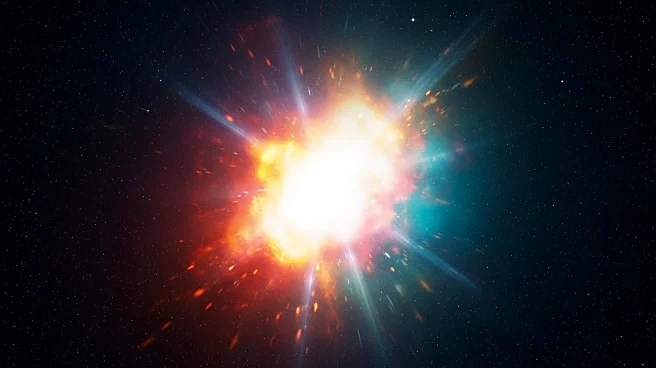What is the story about?
What's Happening?
Recent astronomical observations have raised questions about the validity of the Big Bang theory, a cornerstone of modern cosmology. The theory, which describes the universe's origin and expansion, is facing challenges due to new data that contradicts some of its predictions. Observations from the James Webb Space Telescope have revealed fully formed galaxies much earlier than expected, suggesting discrepancies in the timeline of cosmic evolution. Additionally, the Hubble tension, a discrepancy between predicted and observed rates of cosmic expansion, has further complicated the theory. These findings have prompted scientists to reconsider aspects of the Big Bang theory, including the roles of dark matter and dark energy, which are crucial to its framework.
Why It's Important?
The potential crisis in the Big Bang theory could have significant implications for our understanding of the universe's history and structure. If the theory requires revision, it may lead to new insights into the fundamental forces and components that govern cosmic evolution. The challenges posed by recent observations highlight the dynamic nature of scientific inquiry and the need for continuous reevaluation of established theories. Resolving these discrepancies is crucial for advancing cosmological research and refining models that explain the universe's behavior. The debate surrounding the Big Bang theory underscores the importance of empirical evidence in shaping scientific consensus and driving innovation in astrophysics.
What's Next?
Scientists are expected to conduct further research and analysis to address the inconsistencies in the Big Bang theory. This may involve developing new models or modifying existing ones to account for the latest observations. Collaborative efforts among astronomers, physicists, and cosmologists will be essential in exploring alternative explanations and refining theoretical frameworks. The ongoing debate may lead to breakthroughs in understanding dark matter, dark energy, and other cosmic phenomena. As research progresses, the scientific community will continue to monitor developments and adjust theories to align with emerging data.
Beyond the Headlines
The challenges to the Big Bang theory highlight broader philosophical questions about the nature of scientific knowledge and the limits of human understanding. The potential need to revise a foundational theory reflects the evolving nature of science and the importance of adaptability in the face of new evidence. The debate also raises ethical considerations regarding the allocation of resources for scientific research and the prioritization of studies that address fundamental questions about the universe. The pursuit of answers to these cosmic mysteries exemplifies the human drive for exploration and discovery, emphasizing the role of science in expanding our worldview.
















